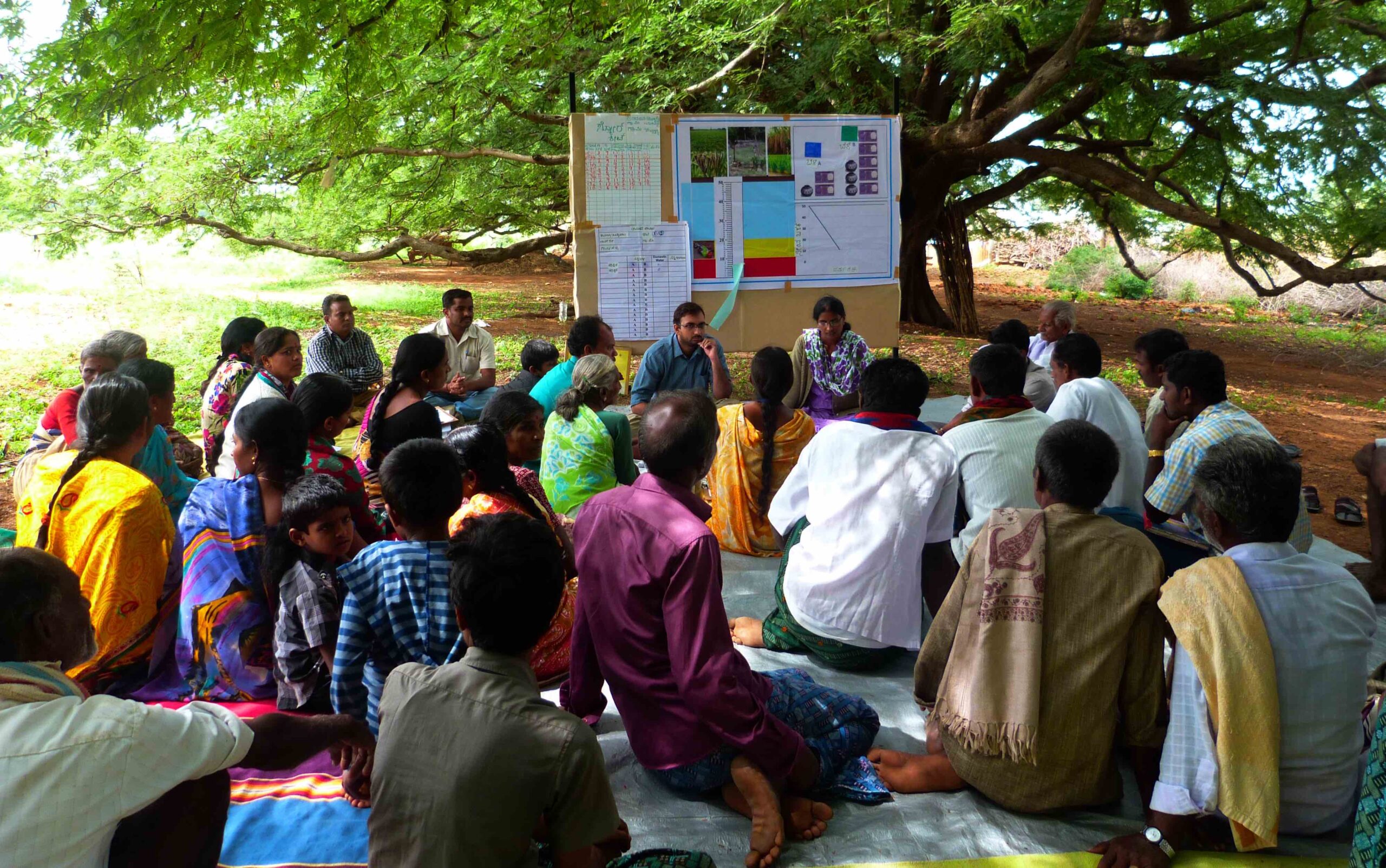An emerging body of literature explores “serious games”— participatory behavioral games created for purposes other than entertainment—as learning tools and interventions for improving natural resource management. Such games, particularly when combined with other tools, have the potential to help agricultural communities make more productive and sustainable use of water resources, by changing individual behavior and fostering cooperation. They represent a structured, replicable approach to support learning, enhance constructive interaction, strengthen norms and governance, and eventually change resource use behavior.
However, tailoring such games to local water contexts can be a challenge. Some farmers depend on groundwater while others use surface water. Water infrastructure, opportunities to save water, and experience with cooperation vary between villages. Matching the local situation with the right game intervention requires that field facilitators engage with and understand local context, as we learned during the Scaling up experiential learning tools for sustainable water governance project in India. In our recent synthesis study, we conceptualize that the games create an experiential learning action situation. If this features management challenges similar to those participants face in real life, their learning can contribute to meaningful institutional and behavioral change (Figure 1).
Figure 1

Source: Falk et al. 2023
The serious game models major characteristics of the real-life context, so participants can learn through making decisions and observing outcomes.
We developed the “Decision Tree for Water Commons Games” to quickly identify which games fit the situation in a particular community, drawing on local expert knowledge (Figure 2). Process facilitators ask a series of questions, incorporated in a smartphone app, to characterize the local water management context and possible social learning interventions. They start by asking if water scarcity is an issue. If there is no awareness of water management issues, open probing questions are needed. If water scarcity is a concern, the decision tree next asks whether the community primarily uses surface water from a canal irrigation system. If communities instead mostly use groundwater, the decision tree leads to questions on wells running dry and whether groundwater is intensively used for irrigation. A query then asks whether there are alternative management practices—such as more water-efficient crop choices that could improve group outcomes. The final question checks existing local rules to coordinate crop choices and allocate water. Facilitators ask similar sequences of questions about channel irrigation management, collective maintenance of water harvesting structures, and allocation of surface water from small ponds or “tanks.” The process ends with a recommendation for which approaches would fit best with community challenges (Groundwater Game, Surface Water Game, Dam Maintenance Game, Canal Irrigation Game, Crop-Water Budgeting, and Composite Landscape Assessment and Restoration Tool.)
Figure 2

Source: Authors
In India, groundwater games encouraged improved water governance and collective action. Respondents in treated communities in the state of Andhra Pradesh expressed the need for farmers to cooperate significantly more frequently and were more likely to have introduced water registers or groundwater management-related rules compared to control sites. A study on the surface water game in Madhya Pradesh revealed that almost two years after the intervention, key informants of treated communities reported significantly more maintenance activities than in control sites.
With that as a starting point, we explored whether our experiential learning tools could be applied in other contexts. In sub-Saharan Africa, groundwater use for irrigation is at an early stage but rapidly expanding. In our research in the Upper East Region of Ghana, farmers generally prioritized more productive use of existing groundwater. In Ethiopia, groundwater users had little awareness of how sharing an aquifer connected them. In both places, we needed to adjust the game narrative and crop choices to fit local conditions. In Ghana’s Keta basin, more significant adjustments were necessary for the game to be relevant, as farmers’ dilemmas were focused not around managing water shortages, but water salinity from salt-water intrusion as a result of depleting water tables. Adjusting the narrative and choices in the game improved its relevance and effectiveness. In both countries, playing the Groundwater Game alerted farmers about the depletable and shared biophysical nature of groundwater resources and how users and their choices affect each other’s water availability. This prompted a mental shift towards realizing the importance of collective action for groundwater governance.
Our work seeks to develop scalable learning tools, tailoring them to match local conditions to foster effective institutional and behavioral change. The Decision Tree for Water Commons Games should be understood as a guide for key questions to ask—to help to make intervention decisions based on local knowledge, without requiring detailed scientific models to fully understand the social-ecological system. Thus, it can also be useful for scaling up interventions. Sometimes, the answers cast light on changes needed in an existing game, experiential learning package, or the Decision Tree itself, to make it better fit a specific context and ensure meaningful learning outcomes—issues we are continuing to explore.
Thomas Falk is a Research Fellow with IFPRI’s Natural Resources and Resilience (NRR) Unit; Vishwambhar Duche is Senior Scientific Officer with the International Crops Research Institute for the Semi-Arid Tropics (ICRISAT); Richu Sanil is a Senior Project Manager with the Foundation for Ecological Security (FES), Pratiti Priyadarshini is an FES Senior Program Manager; Ruth Meinzen Dick is an NRR Senior Research Fellow; Bryan Bruns is a sociologist, independent researcher, and consultant. Referenced synthesis study is peer-reviewed.
The project on Experimental Games for Strengthening Collective Action? Learning from Field Experiments in India, was funded by the German Federal Ministry for Economic Cooperation and Development (BMZ), and commissioned and administered through the Deutsche Gesellschaft für Internationale Zusammenarbeit (GIZ) Fund for International Agricultural Research (FIA). It was implemented by the Foundation for Ecological Security (FES), International Food Policy Research Institute (IFPRI), and the International Crops Research Institute for the Semi-arid Tropics (ICRISAT). The study also received support from the CGIAR NEXUS Gains Initiative.
Cited paper:
Falk, Thomas; Zhang, Wei; Meinzen-Dick, Ruth Suseela; Bartels, Lara; Sanil, Richu; Priyadarshini, Pratiti; and Soliev, Ilkhom. 2023. Games for experiential learning: Triggering collective changes in commons management. Ecology and Society 28(1): 30. https://doi.org/10.5751/ES-13862-280130







